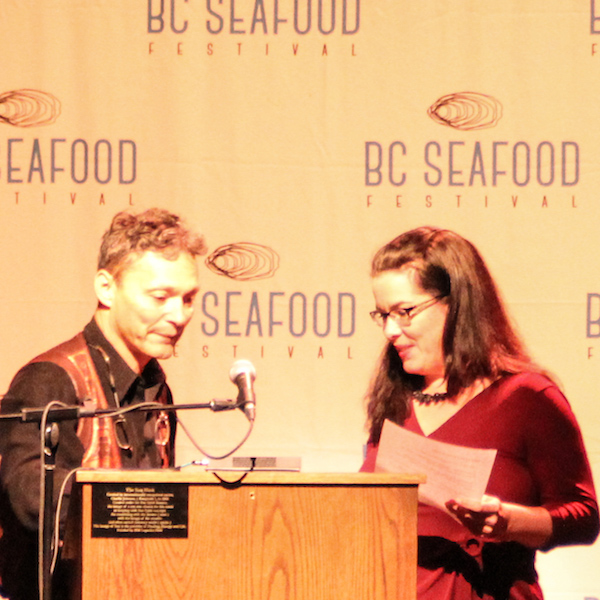Beware the eco-colonialist, First Nations chiefs warned
10,000-year journey that is just bearing fruit threatened by foreign funded activism says Calvin Helin, a leading authority on economic independence for First Nations
By Fabian Dawson
SeaWestNews
First Nations leaders in BC should be wary of activists who are trying to gain their support to stop energy and natural resource projects in Canada, warns Calvin Helin, a leading authority on economic independence for First Nations.
Describing the activists as “eco-colonialists”, Helin (pictured left) a First Nations entrepreneur, lawyer, and best-selling author said the groups are being funded by massive American foundations, whose only interest is to control Canadian energy and natural resources.
“These eco-colonialists get paid when they shut things down in Canada,” Helin told SeaWestNews, after delivering the keynote address at this year’s edition of the BC Seafood Expo in Courtenay on Vancouver Island yesterday.
“Under the guise of environmental concern, they keep First Nations peoples in poverty and restrict economic growth,” he said.
“We have been watching over our seas and lands for over 10,000 years and we don’t need these big-city folk and activists with huge American foundation money coming up here to tell us what to do…they have no regard for our communities and keep us from moving forward.”
Helin, a member of the Tsimshian Nation, comes from the community of Lax Kw’alaams on the Northwest coast of British Columbia, Canada.
The son of a hereditary chief, Helin is the best-selling author of works such as Dances with Dependency: Out of Poverty through Self-Reliance and Dances with Development: Making Good Money from Natural Resources.
In his keynote address at the BC Seafood Expo, one of the largest seafood industry trade events in the Pacific Northwest, Helin said First Nations communities have been on a “10,000-year canoe journey” that is just bringing prosperity to remote communities.
“We are moving from welfare to wealth management and a lot of chiefs are beginning to understand how these activists work…the easiest thing for these activists is to be negative because they don’t build anything,” said Helin.
In Northern BC, where he is working with 35 First Nations groups to build an energy corridor, Helin said the communities there have a 90 percent unemployment rate.
“This will be the greenest pipeline ever built with Canadian technology and our environmental stewardship, to bring prosperity to our future generations,” said Helin, who hails from a commercial fishing family.
Helin, in his keynote address, praised the partnerships between First Nations groups and the aquaculture industry saying they are examples of people working together for a better future.
Over 40 First Nation and Indigenous communities are now directly or indirectly involved in farming seafood in Canada.
The BC Seafood Expo held in conjunction with the annual BC Shellfish and Seafood Festival, is being targeted by a group of protestors working in tandem with foreign-funded activists who are opposed to salmon farming.
Sources within the anti-fish farm lobby group said they have a plan to sign up 100 First Nations groups to influence the government not to renew fish farm tenures in the Broughton Archipelago.
Helin said most of the chiefs being targeted in this campaign have “no skin in the game” and hoped they would focus their energies on improving the economy of their communities rather than be used as pawns by the anti-fish farm lobby.
The anti-salmon farming activist campaign threatens over 6,600 jobs in British Columbia and about 20 economic and social partnerships with First Nations.
Much of the funding flows from an American umbrella organization called The Consultative Group on Biological Diversity, which is used as a clearing house for activist groups to demarket farmed Canadian salmon and increase the value of Alaskan ranched salmon.
The Expo also heard from several First Nations groups from the coastal areas of BC who have been actively engaged in seafood economic opportunities though research, pilot and commercial projects.
Dr. Myron Roth, aquaculture and seafood industry specialist with the Government of British Columbia, said there is an increasing number of First Nations groups who are interested in aquaculture projects and the seafood industry.
Dr. Roth moderated a session which examined business opportunities for First Nations communities along the entire aquaculture and fisheries value chain.
First Nations communities in the Haida Gwaii, North Coast, Central Coast, and North Vancouver Island, have been working to develop marine plans and coast resource economic opportunities, one of which is aquaculture and fisheries.
“We discussed ways to open up capital funding for aquaculture projects that will unlock potential for coastal First Nations communities,” said Dr. Roth.
“We also got updates on various projects and had a good discussion on financial and business resources for First Nations communities to develop opportunities in the seafood value chain,” Dr. Roth told SeaWestNews.
RELATED STORIES
“We do not recognize your territorial claims”
Inside the fear mongering campaign against aquaculture
